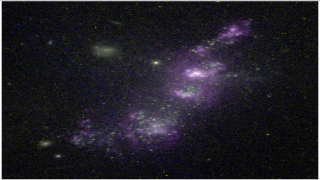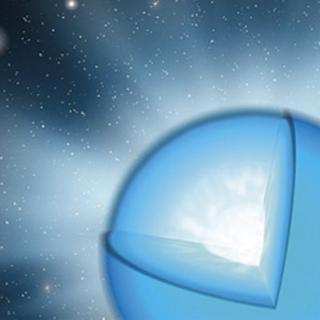Bibcode
Chanchaiworawit, Krittapas; Guzmán, Rafael; Salvador-Solé, Eduard; Rodríguez Espinosa, Jose Miguel; Calvi, Rosa; Manrique, Alberto; Gallego, Jesus; Herrero, Artemio; Marín-Franch, Antonio; Mas-Hesse, Jose Miguel
Bibliographical reference
The Astrophysical Journal, Volume 877, Issue 1, article id. 51, 14 pp. (2019).
Advertised on:
5
2019
Journal
Citations
21
Refereed citations
20
Description
We present evidence for the discovery of a protocluster of starburst
galaxies (Lyα emitters, or LAEs) near the end of the epoch of
reionization. The recent trend in the search for high-redshift
protoclusters focuses on utilizing bias tracers, such as luminous
starburst galaxies, as signposts of overdensities. Thus, we conducted a
photometric selection of LAE candidates around a pair of spatially
close, luminous LAEs at z = 6.5 in the Subaru/XMM-Newton Deep Survey
field, using OSIRIS in its imaging mode at the 10.4 m Gran Telescopio
Canarias in La Palma, Spain. The spectroscopic follow-up was done with
OSIRIS in its multiobject spectroscopy capability. We have
spectroscopically confirmed 10 LAEs via their recognizable Lyα
emission feature. The redshifts of these LAEs shed light on their 3D
distributions within the observing window defined by the photometric
selection. We have derived the galaxy number density contrast of
{δ }gal}={3.18}-1.99+3.47, which
led to the expected mass of the overdensity of
{8.40}-1.39+2.98× {10}14
{M}ȯ . We also found evidence for the presence of a
virialized core with
{M}200={4.06}-1.90+2.77×
{10}13 {M}ȯ within this overdensity. Based
on the extended Press–Schechter formalism, this overdensity would
continue to grow in the linear regime and collapse to form a galaxy
cluster at {z}coll}={0.84}-0.43+0.57.
By the time this protocluster reaches z = 0, it will be a massive
cluster of galaxies with mass
{1.54}-0.69+1.12× {10}15
{M}ȯ , comparable to the Coma cluster. Thus, our careful
analysis has pointed to evidence that this protocluster would evolve
into a Coma-analog cluster in the present-day universe.
Related projects

Starbursts in Galaxies GEFE
Starsbursts play a key role in the cosmic evolution of galaxies, and thus in the star formation (SF) history of the universe, the production of metals, and the feedback coupling galaxies with the cosmic web. Extreme SF conditions prevail early on during the formation of the first stars and galaxies, therefore, the starburst phenomenon constitutes a
Casiana
Muñoz Tuñón

Physical properties and evolution of Massive Stars
This project aims at the searching, observation and analysis of massive stars in nearby galaxies to provide a solid empirical ground to understand their physical properties as a function of those key parameters that gobern their evolution (i.e. mass, spin, metallicity, mass loss, and binary interaction). Massive stars are central objects to
Sergio
Simón Díaz